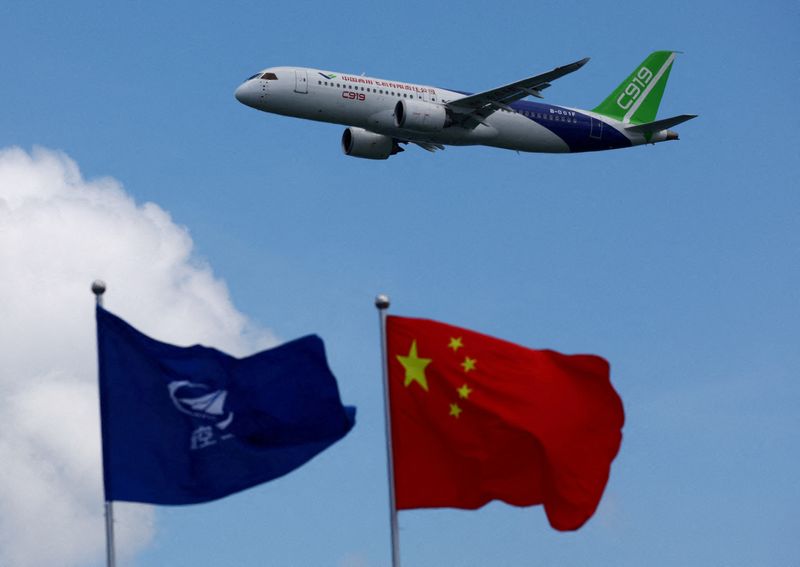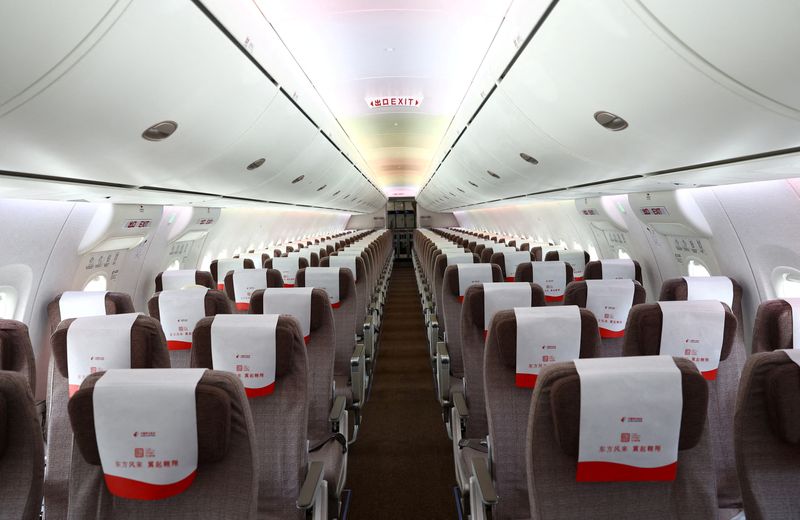By Brenda Goh and Lisa Barrington
SINGAPORE (Reuters) - Chinese state-owned planemaker COMAC upstaged industry leaders Airbus and Boeing (NYSE:BA) at the Singapore Airshow this week, showing off its self-developed C919 and ARJ21 jets as it pursues international certifications and foreign orders.
"A reliable new choice," proclaimed an advertisement on COMAC's large booth in the centre of the show's event hall.
Aviation, government and investment professionals thronged to its display, demonstrating the keen interest from trade delegates in learning more about a company with limited public engagement outside its home market to date.
The C919, a rival to the Boeing 737 MAX and Airbus A320neo family single-aisle jets, flew for the first time outside Chinese territory. Show attendees said they saw it as a opportunistic coming out for COMAC, which took centre stage with a 50-plane order from China's Tibet Airlines on Tuesday.
COMAC was able to seize a moment when the two dominant Western planemakers are dealing with supply chain issues that have frustrated airline customers and Boeing is wrestling with a series of crises, including a mid-air panel blow-out in January.
"I generally absolutely welcome COMAC coming to the party," said Michael Szucs, CEO of Philippine budget airline Cebu Pacific, adding the Chi nese firm had sent a large delegation to visit the carrier eight months ago.
"I'd rather it was a three horse race rather than a two horse race," he said.
But the predominant view among aviation industry leaders attending Asia's biggest aviation gathering was that COMAC had a long road ahead to become a serious competitor and it would largely operate in China's domestic market in the near term.
"I think people will take a second look because of all these delivery problems that Airbus and Boeing are having, but we have to be realistic because the C919 has not been certified by certain authorities so the call to action is limited," said Subhas Menon, director general of the Association of Asia Pacific Airlines.
COMAC, in contrast to Airbus and Boeing, did not take media questions at order announcements and declined to make executives available for interview to discuss its show presence and other plans.
CERTIFICATION ISSUES
The C919 has attracted more than 1,000 orders so far, largely from Chinese airlines and lessors, according to Chinese state media.
Aviation executives at the show said there was definitely interest in the model, but potential buyers and lessors wanted to see U.S. and European regulatory approval. The plane's design is only certified by China.
China's aviation authority has said it would promote the plane internationally this year and pursue European Union Aviation Safety Agency (EASA) certification.
GallopAir, a new Brunei-based airline backed by Chinese investors that has ordered 30 COMAC planes including the first overseas C919 purchases, told Reuters it was working with COMAC to get the approvals needed to start flying the ARJ21 jet in Brunei.
But a certification process for the C919 in Brunei was at least two to three years away, managing director Cham Chi said. "COMAC needs to operate more hours...We need to wait and then we have the confidence to deliver."
Indonesian low-cost carrier TransNusa already operates two ARJ21 aircraft, a regional jet predecessor to the C919.
Christian Scherer, CEO of Airbus commercial aircraft, said the European planemaker welcomed the competition but noted the C919 looked like Boeing and Airbus' existing offerings and would not rock the boat in a significant way.
"It's really not bringing any particular differentiation to the market," he told reporters.
Boeing welcomed the competition from COMAC, which was "good for the industry," a spokesperson said.
WESTERN VS DOMESTIC PARTS
Another major uncertainty around the C919 is its reliance on Western suppliers for key components such as its engines and avionics systems, exposing it to geopolitical risk, especially as Beijing's ties with Washington and Brussels come under pressure.
Those parts also face the same supply chain issues hampering production rates at its Western rivals that have far greater economies of scale and longer relationships with key suppliers.
COMAC has said it will invest tens of billions yuan over the next three to five years to expand C919 production capacity and analysts expect it to be working on domestic substitutes for Western parts, but say it could take decades.
"I think they're further advanced as far as airframe, and they're further behind on engine technology. Engine technology is very, very difficult," Ewen McDonald, Rolls-Royce (OTC:RYCEY)'s civil aerospace chief customer officer said in an interview.

"They will need Western engines in the near term."
The C919 engines are supplied by CFM International, a joint venture between GE and Safran (EPA:SAF), but Aero Engine Corporation of China (AECC) is developing a domestic substitute, the CJ-1000A that has not yet been certified.
